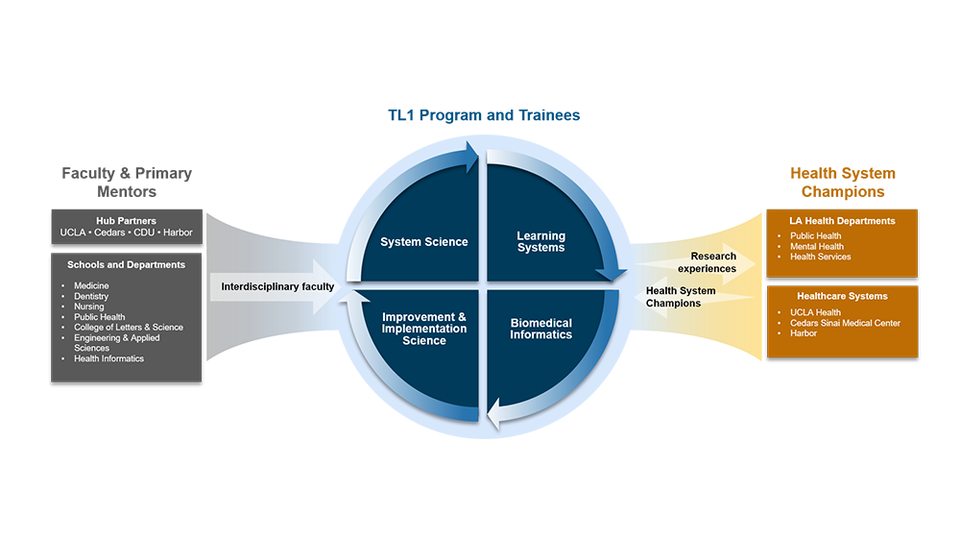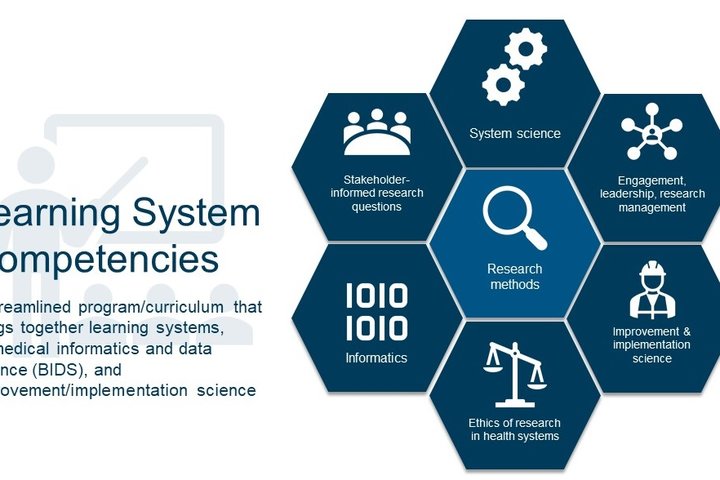About
TL1 Program
Get training to help transform healthcare delivery and public health for everyone.
The UCLA Clinical and Translational Science Institute (CTSI) is a collaboration of UCLA, Cedars-Sinai, Charles R. Drew University, and Lundquist-Harbor-UCLA. The TL1 prepares pre- and postdoctoral trainees to conduct translational research that will improve care delivery for populations. The CTSI envisions the TL1 program as a training opportunity for a next generation of scholars with the expertise and training to make the Learning Health System (see below) a reality.
TL1 trainees will learn to employ methods that leverage modern data systems and learn to develop the skills and approaches needed to continuously improve healthcare and public systems. Trainees will also acquire the fundamental competencies of translation as preparation to apply them to real-world problems in systems. The TL1 emphasizes the health of populations, and health equity.
Areas of focus include biomedical informatics and data science, the science of implementation and dissemination, and system science. All TL1 trainees are taught and mentored by a multidisciplinary faculty with experience in translational science and research mentorship and by research champions from the entities and medical centers that collaborate in the UCLA CTSI.
TL1 Program
The TL1 leverages UCLA, CDU, Cedars-Sinai, and Harbor-Lundquist faculty to provide curriculum and mentorship that enable each trainee to acquire translational competencies and become well-versed in the application of relevant methods. The program:
- Delivers a curriculum that builds core competencies in T3/T4 translational methods focused on population health;
- Supports trainees in the conduct of team-science-based translational research, focused on improving delivery systems;
- Fosters a community of trainees who will progress to be translational scientists; and
Provides learning opportunities involving academic and health system mentors.

Healthcare enterprises and public health systems throughout the United States seek to improve care and outcomes. Combining clinical knowledge with biomedical informatics and data science, and the science of implementation, could transform healthcare delivery and public health for everyone.
The LHS is a paradigm shift that requires new scientists capable of putting its elements into practice.
What if a health system could quickly learn from its experiences to identify opportunities for improvement and be nimble enough to change operations in ways that optimize care? This is the vision of the learning health system (LHS). It is a dynamic enterprise that is designed to learn and that is capable of adapting based on current and evolving knowledge and data. System leaders and scientists have been building the infrastructure needed for the effective collection and analysis of data to support the LHS. To support this system, the TL1 program has a streamlined curriculum that incorporates research methods such as system science, biomedical informatics and data science (BIDS) and implementation/improvement science.

a) Four required courses and one elective (UCLA Schedule of Classes):
- EPIDEM M203/HLT POL M201: System Science for Population Health (fall quarter)
- BIOENGR M227: Medical Information Infrastructures and Internet Technologies (fall quarter)
- HLT POL 225C: Research Methods for Improvement and Implementation Science (spring quarter)
- Scientific writing course
b) Longitudinal team science research
c) Professional development in leadership, success in academia, communication, and other areas of translation
d) Translational science seminars
e) Team science workshops
f) Responsible conduct of research training
g) Quarterly meetings with the TL1 Directors
TL1 trainees will:
- Participate in longitudinal team science research within a health-related system such as a clinical care, educational, or public health system;
- Receive professional development in leadership, success in academia, communication, and other areas of translation;
- Participate in seminars on problems, opportunities, and successes in translational science;
- Receive preparation in scientific writing and other types of scientific communication; and
- Engage with local partnered systems, community organizations, and leaders.